Cullen Sherrill ’23: Strike3Farms Owners Capitalize on Niche Hunting Market
Feature story written by Taylor O'Brien '24, Student Program Assistant, Agribusiness major
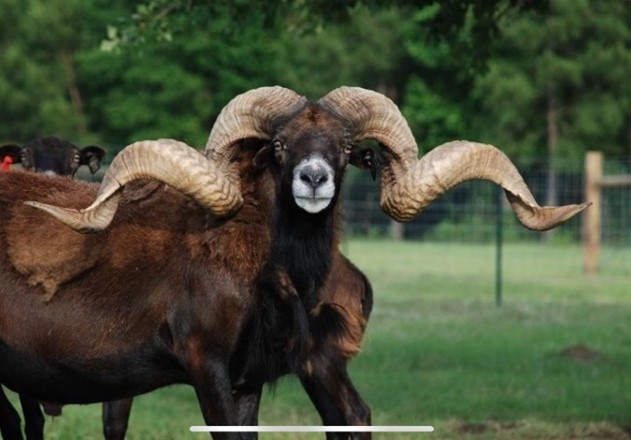
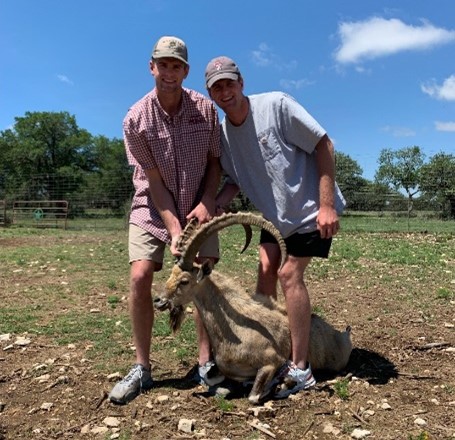
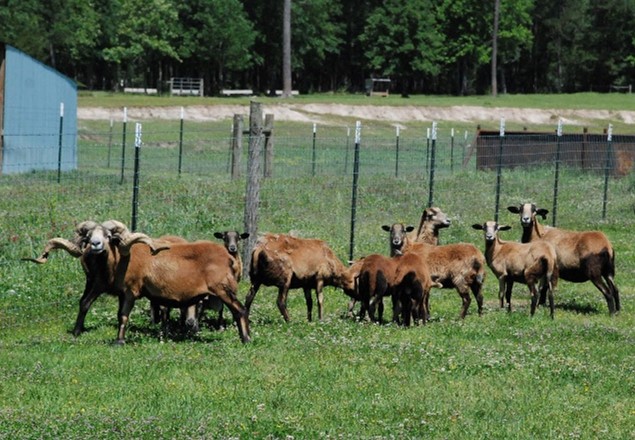
Cullen is a senior Agricultural Economics major from Cypress, Texas. He co-owns Strike3Farms, a trophy horn sheep breeding operation, with his twin brother, Tanner Sherrill. Together, they breed Painted Desert, Texas Dall, Black Hawaiian and Corsican sheep. They focus on superior Texas genetics, with the goal of growing the biggest sheep. Additionally, they do consignment sales for a variety of trophy horn sheep and goat breeds and consult with ranches all over the state of Texas and the southern United States.
From a very young age, Cullen has hunted at his family farm in Kennard with his twin brother. Their interest in the exotic industry sparked when they had the opportunity to hunt at some big high-fence ranches. After realizing this niche market, Cullen and Tanner decided to start their company. Cullen reflected that they “slowly learned the business, learned what people were interested in, what it takes to breed some of the larger rams, and have gained insight from the whitetail industry on similar breeding strategies.” While playing college baseball, the brothers realized that “we were doing more sales than baseball. So, we went our separate ways with that and took this as more of a full-time idea.”
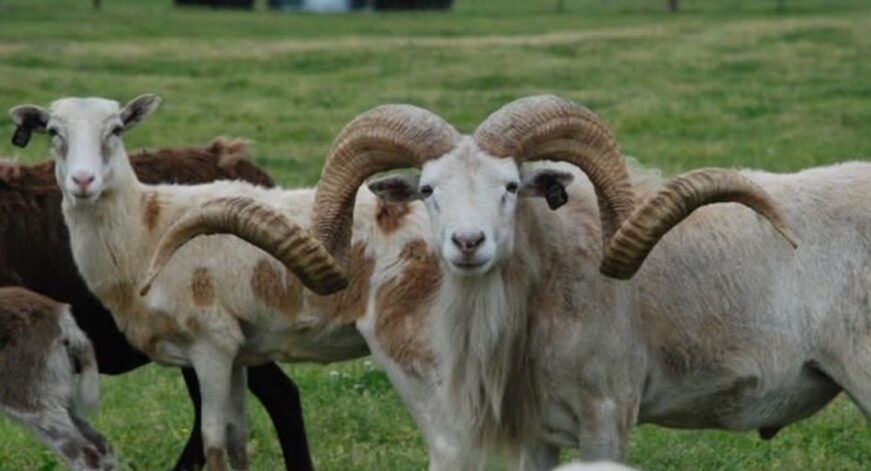
Cullen’s experience with entrepreneurship comes from his parents always encouraging him to work hard and be independent. Cullen stated, “We have always wanted to do our own thing. My brother and I always had a business growing up, whether that was mowing lawns or selling something. There was always that entrepreneurial spirit to want to make my own money, have my own goals and pursue those. My dad has kind of reinforced that. He is an independent salesman and demonstrated that relationships are everything.”
Cullen defines entrepreneurship as “having an idea and pursuing it though difficulties, through challenges, and seeing it through. It is having patience that it is going to work and trying your best to modify or increase demand of your product in some way, shape or form.”
He applies this definition to Strike3Farms, as operating the business has not come without challenges. Cullen shared that he and his brother are some of the youngest people in the exotic sheep industry, competing with others who have decades of experience. He also balances making deliveries each week and attending his classes by coordinating with his brother who attends Texas Tech University. Cullen says that sharing the same ideas and equal passions with his brother helps them overcome any obstacles. Cullen also is thankful for a client base that is responsive and adaptive with their schedule.
“If you truly have a passion for something, you make time for it. I have had a lot of late nights, lost sleep, and hours on the road driving; but at the end of the day, I wouldn’t change anything. We have so much fun doing this, seeing new ranches and new opportunities. I think every opportunity should be looked at as something that can lead to something else and open doors.”
Cullen Sherrill ’23
Strike3Farms has recorded four world-record sheep and goats in the Safari Club International Book, which recognizes big game hunters globally. He has also been able to guide and help with hunts related to that effort.
While he values recognition, Cullen shares the most rewarding aspect of the business is working with family at their family farm due to the trust, loyalty, and a shared passion for what they do. Their farm has been in the family since the early 1900s, and Cullen appreciates that “we have been able to just slowly improve the land, improve what we have been able to do with it, be stewards of it, and be shepherds of these sheep.”
As an AGEC 425 “Survivor,” Cullen places the classes he took in the Dianne and M. Edward ’74 Agribusiness Entrepreneurship Program as another one of his most rewarding experiences.
“Through the program, I was able to portray my business enterprise on a larger screen, give people a better idea of what it is we do, and make that niche market known. It meant a lot to be able to share that with people.”
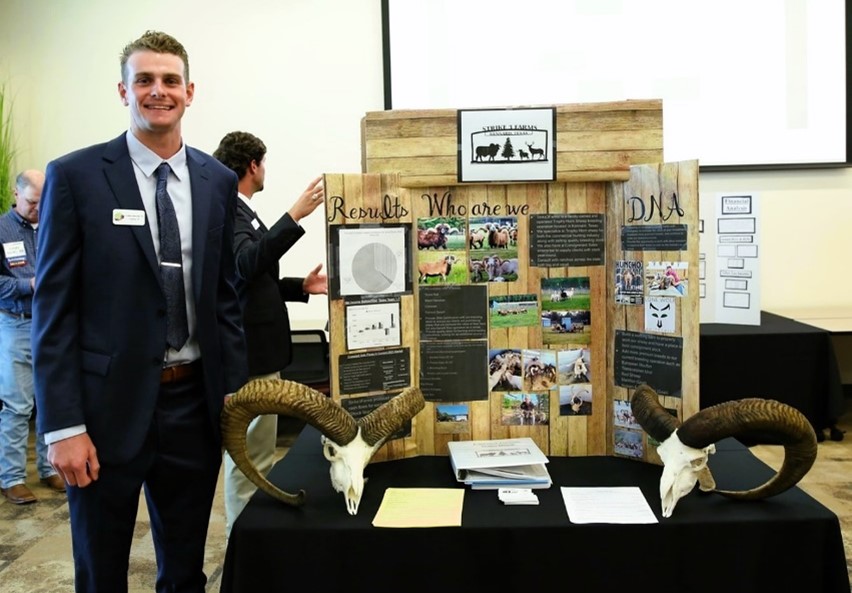
In the 2023 Texas Farm Credit Entrepreneurial Dreams Symposium, Cullen presented Strike3Farms as his AGEC 424/425 project enterprise. As a finalist in the business pitch competition, Cullen received the following awards:
- 3rd Place, Final Business Pitch
- Honorable Mention, Preliminary Business Pitch
- AGEC 425 Professional Engagement & Networking Award
- Capital Farm Credit Scholarship
What advice do you have to share with aspiring entrepreneurs?
- Just go for it! It is never too early to start.
- Ask as many questions and build as many relationships as you can. Through that, you can pick up on what works and what doesn’t. The more questions you ask and the more professional you are with people, the better. Try to be hands-on with mentors and bring value to them first.
- You can never know too many people. If there is ever an issue that pops up or you have a question, having a good set of mentors and people to call and to learn from is key to ultimately growing your business.
- Instead of thinking about networking from a money perspective, try to think about what you take away knowledge-wise. It turns into monetary value later.
- Have at least an idea of what you want for the future of the business. If you go into it, you need to have an idea of what it could look like 5 years, 10 years, down the road. You don’t want to start too small as far as what you think the projections of it are. Think big, and then you can always downsize and modify ideas from there.
What quote has most influenced your life or career and why?
“Put your passion in your work.” – Micheal Burt
This quote has helped my brother and me because we have never looked at what we do as work. We are blessed to have the opportunity to raise these sheep, and allowing our passion to shine through our company is something I am very proud of. When you truly believe in something, you see it through good and bad times. Raising livestock is a great life teacher and has established tremendous work habits that I will carry into other job opportunities after graduation.
How has the Rister ’74 Agribusiness Entrepreneurship Program better prepared you for your career, and what were your biggest takeaways?
- The responsibility. It gave me a slight taste of why I need to know every aspect of my business. This includes the responsibility of knowing what my numbers mean, what my cash flow is, and what enterprises profit or require me to be cautious at end of the year.
- The relationships and the network that I built with mentors. I still keep in touch with some of my mentors from the class, and I think I will always be able to call on some of those for advice.
- The outcome. The program is set up for students’ overall benefit and success. I learned that how much I put into it ultimately determines what I got out of it.
